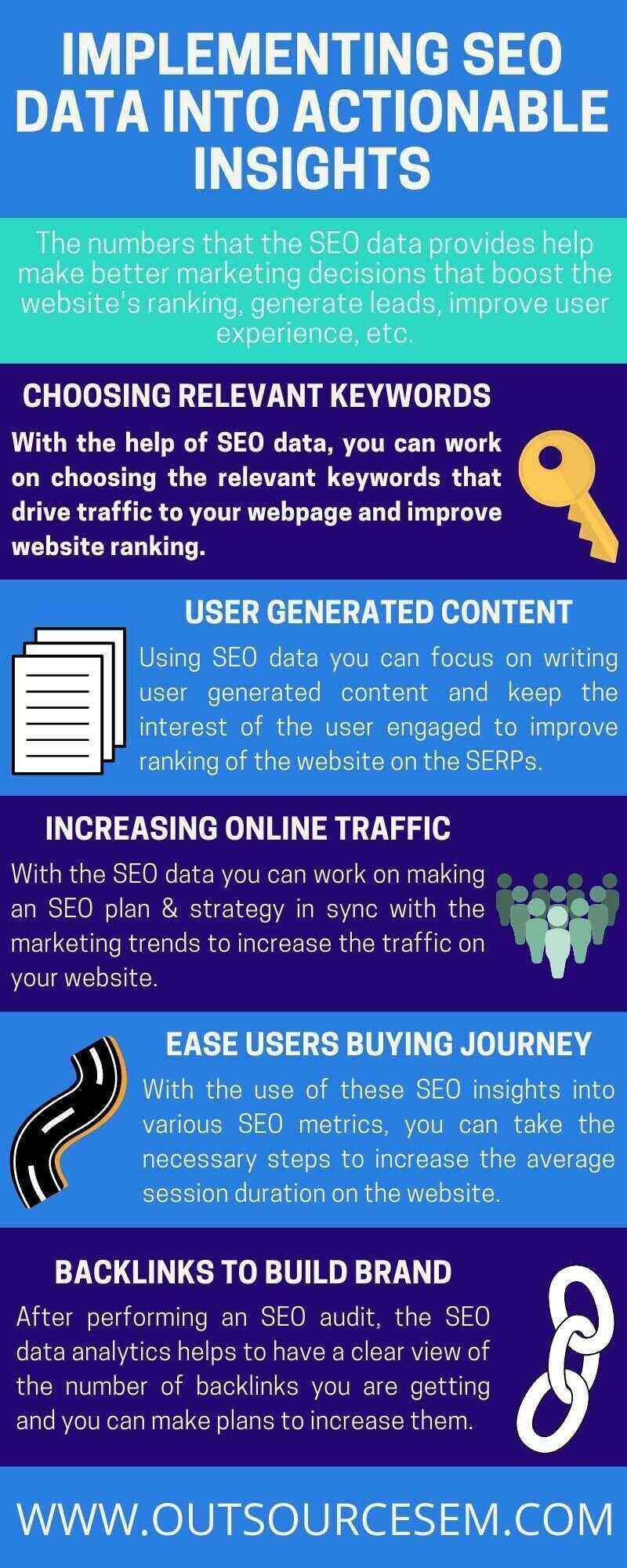With dynamism in digital marketing, the consumers dictate the online marketing world, looking for products or services with the latest SEO trends, PPC trends, e-commerce trends, etc. As there is intense competition in the online marketing world, it becomes more essential to grab visitors' attention towards your website. The SEO data comes in handy in this regard as you get to see the performance of various SEO metrics. With a data-driven approach, you can make better-informed decisions in your SEO marketing strategy, thus avoiding random guesses to achieve desired marketing goals. Let us see ahead in the blog how the SEO data helps generate traffic on the website, increases website ranking on the SERPs and much more.
What is SEO data ?
SEO data is relevant information that informs businesses about the performance of the SEO campaign. These SEO insights can be related to multiple SEO metrics that inform how the marketing efforts are performing. These can be organic traffic, impression share, click-through rate, page rank, etc. With the use of this data, a necessary SEO plan & strategy can be formulated to lure the visited to take the intended action on the webpage.
SEO data highlights the areas of concern on the web page that needs to be optimized. These may be updating the content, focusing on writing unique content, performing e-commerce keyword research to increase traffic, etc. The SEO data helps improve the website ranking on the SERPs and maintain the position if already ranking for the relevant keywords. You can work on strategic marketing to make the users click on your website for the keywords or search terms entered. You can also work on web design to engage the users interested in your product or services. As in PPC ads, you focus on writing engaging ad copies and ad relevance so that the chances of the user taking the intended action increases. Similarly, you need to focus on the point that the product description page on the website has the relevant content related to the one displayed for the search query. You can also add the final URL for the specific pages that the user is looking for. This would help increase the users' time spent on the web page, which ultimately leads to an increase in taking the intended action by the user.
Implementing SEO data into actionable insights

1. Choosing relevant keywords - With the help of SEO data, you can work on choosing the relevant keywords that drive traffic to your webpage. In your SEO strategy, it is crucial to analyze SEO metrics' performance and make strategies to choose the relevant keywords for your business. As you perform SEO keyword research to improve SEO campaigns' performance in Google SEO, you need to do so with the help of SEO data.
In your SEO marketing strategy, conducting keyword research is vital to get in touch with the relevant audience. Be it any form of digital marketing like search engine optimization, search engine management, etc. you need to consider choosing high-traffic relevant keywords that drive more traffic to the web page. These keywords or search terms should best match the users' search query. There are myths regarding SEO marketing that you need to use keywords with high search volume. However, this is not always true, as you can target keywords that have a low search volume. As you use the keyword planner tool in Google SEO and conduct keyword research, in the same way, you need to choose keywords that best match users' search queries.
As you avoid keyword stuffing in Google SEO, you do not have users leaving your website due to this SEO mistake in your SEO marketing strategy. Whether it is local SEO or any form of SEO marketing, you need to choose the keywords that drive quality traffic to your webpage. The SEO insights also help you focus on audience segmentation so that you get to have relevant users on your webpage with high chances of taking the intended action. Some of the points that you can focus on in your SEO strategy to choose relevant keywords are listed below.
a. Check for average monthly searches.
b. Identify keywords in niche marketing.
c. Perform competition analysis to see which keywords they are targeting.
d. Choose keywords based on demographic targeting.
e. Focus on writing keywords in the meta titles, alt text, product description pages, headlines, title tags, etc.

2. Focus on user generated content - With the help of SEO insights, you get to focus on user-generated content. With the help of SEO data, you can make informed decisions in your SEO strategy to improve your SEO campaign's performance. The next point to focus on in this regard is user-generated content. The users in this digital era like to have videos to get the details of the product or services that the business is offering. So, you need to focus on having content that resonates with the user's intent. You may consider having videos, short text information, etc.
As the SEO marketing trends keep evolving with the marketing trends, you need to focus on including them in the product or services you offer. You need to include the PPC trends, SEO trends, e-commerce trends, etc., so that the user feels that the company is providing the product or services with the latest digital marketing trends. This would also help you get in touch with the users that are just doing window shopping and build brand awareness. The more users get to see your website for the relevant search queries; the more are the chances of the user getting in touch with your business. Some of the points you can consider in your SEO insights strategy to increase visitors to your website are listed below.
a. Offer discounts and offers.
b. Promote your social media pages.
c. Focus on social media marketing to analyze users' buying journey.
d. Encourage users to leave suggestions.
e. Focus on dividing the web page into different sections.

3. Increasing online traffic - Another point that you can work on implementing in your SEO plan & strategy is increasing online traffic. Whether it is search engine optimization or PPC advertising, the prime focus for any digital marketer is increasing online traffic on the landing page. All the desired marketing or advertising goals could be achieved only when you have a huge number of users on your website. So, the more number of users you have on your website, the higher are the chances that the visitor would take the intended action.
The SEO insights data help in knowing which of the SEO KPIs need to be optimized to improve the performance of the SEO campaign. These can be pages per session, average session duration, top exit pages, page load time, organic sessions, lead generation, branded v non-branded keywords, etc. You can also consider performing a technical SEO audit to identify the critical areas that need to be optimized. As you consider SEO data to improve the performance of the Google SEO, in the same way, these SEO insights help to know what the visitor is searching for on the webpage and make changes in your SEO plan accordingly. Some of the points that you can consider to increase organic traffic are mentioned below.
a. Creating attractive page designs.
b. Reducing the page loading speed.
c. Optimizing website for mobile devices.
d. Page titles and headlines should be highlighted.

4. Ease users buying journey - With the SEO data, you can consider preparing a roadmap to ease the users' buying journey. The SEO insights into the users' buying journey would help increase the visitors' trust. When you work on improving the buying journey, the user's interest is engaged with the product or services that you offer. As you focus on writing great content, optimizing images on the website, including an eye-catching call to action, etc., to grab the users' attention on the website, similarly, you need to focus on improving the users buying journey.
The users to your website can be from various online platforms and you cannot make a separate buying journey for every user. So, in your SEO marketing strategy, with the use of these SEO insights into various SEO metrics, you can take the necessary steps to increase the average session duration on the website. As you have the most impatient users in this digital era as 40% users leave the website if the page does not load within 3 seconds. So, you need to consider improving the page loading speed and focus on writing user-generated content so that the user's interest is engaged. You can consider working on SEO pagination in your SEO strategy to improve the users' buying journey. Some of the points that you can focus on enhancing the users' buying journey with SEO insights and improving the performance of the SEO campaign are mentioned below.
a. Focus on touching the unique selling point of users.
b. Improving website navigation.
c. Building customer relationships.
d. Focus on ratings and reviews of the users and inculcate the required changes in the campaign.
e. Focus on user personalization with email marketing, content marketing, etc.

5. Using backlink data to build brand - Another point that you need to focus on in using the SEO data to boost your SEO strategies to lure the visitors on the web page in taking the intended action is using backlinks. After performing an SEO audit, the SEO data analytics helps to have a clear view of the number of backlinks you are getting. You need to determine the data to have a clear SEO insight into how you can use this data to increase tariffs on the website.
This SEO data provides a clear idea of where you see the website traffic coming from. You may consider preparing an attribution report in Google Analytics to determine where the users reach your web page. As in PPC ads, you run ad campaigns like Facebook Ads, LinkedIn Ads, YouTube Ads, etc., in your social media marketing strategy to increase the impression share on your landing page. In the same way, you may have users to your website from various online platforms.
You need to identify these platforms using these SEO insights and then make an SEO plan & strategy to ensure that you wish to continue receiving the links from them or not. With this SEO data, you can formulate an SEO marketing strategy and avoid getting links from blackhat websites (if any). However, if you are getting links from relevant websites, you need to work on affiliate marketing to increase the number of backlinks to your webpage. Quality backlinks from relevant websites increase traffic to your website and help build brand awareness as the users think the website is trustworthy. It increases the users' trust and you need to work on an SEO strategy to retain the users to your products or services in the long run. Some points that you can focus on in your SEO strategy to get quality backlinks are listed below.
a. Focus on internal linking and external linking.
b. Boost guest blogging.
c. Perform competitor analysis.
d. Repotting and fixing broken links (if any).
e. Updating content on the page.

Types of SEO data
1. Organic rankings – As multiple changes are happening in the digital marketing world, the organic ranking of your SEO website keeps varying. To maintain the desired ranking, you need to analyze the organic traffic you are getting. When you perform an SEO audit, the data that you get for your SEO website highlights how your marketing efforts are performing. The SEO data highlights the organic traffic on your website; you can then work on taking the necessary steps in your SEO optimization strategy to increase the traffic on your website. As you focus on writing engaging content, how-to content, etc., on increasing the number of users, in the same way, you need to write organized content that grabs the users' attention to make a click on your website for the search terms or keywords.
2. Number of backlinks - The next vital data that you can get is the number of backlinks. The backlinks to your website can be from various online platforms. So, it becomes quite essential for your SEO website to determine how many links your website is receiving. The more backlinks that your SEO website has, the better it is for the business as it boosts brand awareness, increases users' trust, helps in peer to peer to marketing, etc. You need to ensure that you avoid gray hat techniques so that your website is not penalized by search engines.
3. Keyword monthly search volume - Another SEO data that you can get for your SEO website is the keyword monthly search volume. This data helps you to understand how much the users are interested in your website. The keyword monthly search volume varies according to the number of searches the users perform. The more people search for the keywords your business offers, the keyword search volume keeps increasing. It becomes even essential for e-commerce websites as they have e-commerce PPC and organic results for the search terms entered. As they focus on improving e-commerce content to lure visitors to their website with holiday ads, discounts & offers, etc., they need to determine the average search volume weekly or monthly. With this data, you also get to know the target audience's interest.
4. Page speed - Not only do you need to optimize your website for mobile devices but you also need to improve the page loading speed. The much better the page loads, the more time the user has to stay on the page. The display URLs should also be optimized so that the user clearly sees the page they are on. For your SEO website, you need to have the content on the website appropriately organized so that the target audience quickly finds the content they are looking for on the website. To avoid losing traffic on your website and keep the user engaged on your website, you need to improve the page loading speed. To do so, you need to ensure that the page has relevant 301 and 302 redirects, image alt text, etc., is highlighted.

5. Bounce rate - One of the essential SEO data that you get is the bounce rate of your SEO website. You can easily measure the bounce rate in Google Analytics and see if it needs to be optimized. To reduce your website's bounce rate, you need to ensure that the page loads in quick time. You need to add canonical tags so that the search engines understand the page does not have duplicate content. It would help show the relevant pages to the users for the search terms entered. Some of the points that you can consider to reduce the bounce rate for your website are given below.
a. Focus on building user experience.
b. Have a responsive web design.
c. Perform a/b testing.

6. Pages indexed - The SEO data provides you with a clear list of pages that the search engine is able to crawl and index. There are pages on your website that you wish the search engines to crawl and specific pages that you do not want to be indexed. For the pages that you do not wish to be crawled, you can consider adding a robots.txt tag. This would help prevent your website's private pages from being shown to the users. When the pages are properly indexed and crawled on your website, your pages appear for the search terms entered by the user.
Round off
The numbers that the SEO data provides help make better marketing decisions that boost the website's ranking, generate leads, improve user experience, etc. With this SEO data, you also get to see how the various metrics are performing so that you can work on strategic marketing to achieve the desired marketing goals. A well-planned SEO strategy aligns your plans to avoid getting lost in the void of digital marketing with so many competitors coming daily. If formulating strategies with SEO data is a troublesome task for you, getting in touch with a digital marketing company would be a good idea.Whether you are offering a service to another agency or vice-versa, white-label partnerships can help your business grow on several SEO KPIs. As you avail of white label PPC services to ensure that the performance of video ads, search ads, mobile ads, display ads, etc. increases and your advertising ROI scales. Similarly, on outsourcing SEO services, you get to have SEO specialists who have years of experience in email marketing, content marketing, link building, SEO analytics, reputation management, market research, etc. and see a drastic change in online sales. With these white label SEO services you can have a clear understanding of SEO analytics and make necessary decisions like SEO copywriting services, detox & penalty removal, etc. to improve the performance of SEO campaigns. Our SEO services are specifically tailored to enhance the online visibility of different businesses, including plumbing, painting, construction, HVAC, and appliance repair and much more. Our SEO strategy is designed to place your business website at the top of search engine results pages. We offer specialized SEO services such as plumbing SEO, painting SEO, construction SEO, HVAC SEO, and appliance repair SEO to generate high-quality leads and maximize your returns.
References
• How to turn data into insights and impactful SEO strategies
• How to use SEO data to make better marketing decisions
